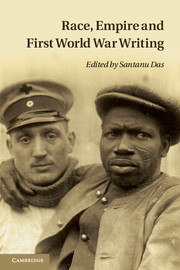Book contents
- Frontmatter
- Contents
- List of illustrations
- Acknowledgements
- Notes on contributors
- Introduction
- PART I VOICES AND EXPERIENCES
- 1 ‘An army of workers’: Chinese indentured labour in First World War France
- 2 Sacrifices, sex, race: Vietnamese experiences in the First World War
- 3 Indians at home, Mesopotamia and France, 1914–1918: towards an intimate history
- 4 ‘We don't want to die for nothing’: askari at war in German East Africa, 1914–1918
- 5 France's legacy to Demba Mboup? A Senegalese griot and his descendants remember his military service during the First World War
- PART II PERCEPTIONS AND PROXIMITIES
- PART III NATIONALISM, MEMORY AND LITERATURE
- Index
- References
4 - ‘We don't want to die for nothing’: askari at war in German East Africa, 1914–1918
Published online by Cambridge University Press: 05 February 2014
- Frontmatter
- Contents
- List of illustrations
- Acknowledgements
- Notes on contributors
- Introduction
- PART I VOICES AND EXPERIENCES
- 1 ‘An army of workers’: Chinese indentured labour in First World War France
- 2 Sacrifices, sex, race: Vietnamese experiences in the First World War
- 3 Indians at home, Mesopotamia and France, 1914–1918: towards an intimate history
- 4 ‘We don't want to die for nothing’: askari at war in German East Africa, 1914–1918
- 5 France's legacy to Demba Mboup? A Senegalese griot and his descendants remember his military service during the First World War
- PART II PERCEPTIONS AND PROXIMITIES
- PART III NATIONALISM, MEMORY AND LITERATURE
- Index
- References
Summary
The First World War initially came to East Africa as a rumour. Mzee Ali, a senior askari, recalled how he first heard in late 1914 of the ‘great and terrible war’ that would soon engulf German East Africa:
From the talk around the campfires we knew this was to be no ordinary war. The sheer scale of it set it apart from any war we had known or been involved in … We knew from the gravity of the discussions that this war would come to our land and that only then would we fully comprehend its nature.
German officers of the Schutztruppe commenced an ‘intense’ military training programme to whip the veteran soldiers back into shape after years of garrison life, and to train a new generation of recruits. A seasoned veteran of East African warfare, Ali nevertheless felt great anxiety about this war's potential ‘scale and horror’ which ‘had magnified out of all proportion in [the askaris’] minds'. Waiting to go into battle against Allied forces in East Africa in April 1915 and struggling to overcome his fear that he would mishandle his weapon in battle, he experienced agitation and sleeplessness. Finally, he pulled himself together: ‘Breathing deeply to control my nervousness, I determined to put my faith and indeed my life in my training and in our officers.’ Relying on his officers and comrades renewed his resolve, and he found that he could sleep again, even while waiting for battle to commence.
- Type
- Chapter
- Information
- Race, Empire and First World War Writing , pp. 90 - 107Publisher: Cambridge University PressPrint publication year: 2011
References
- 7
- Cited by



